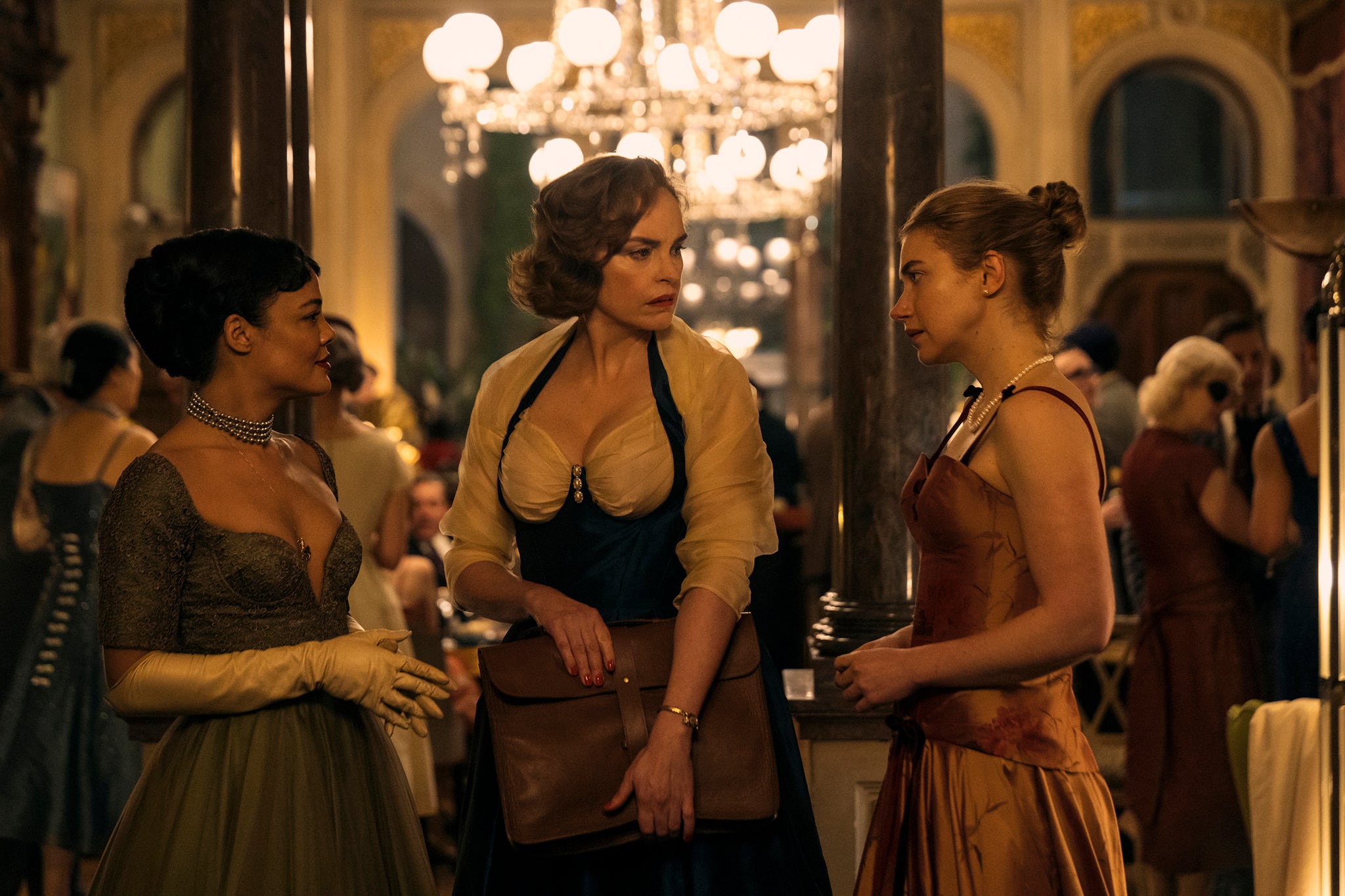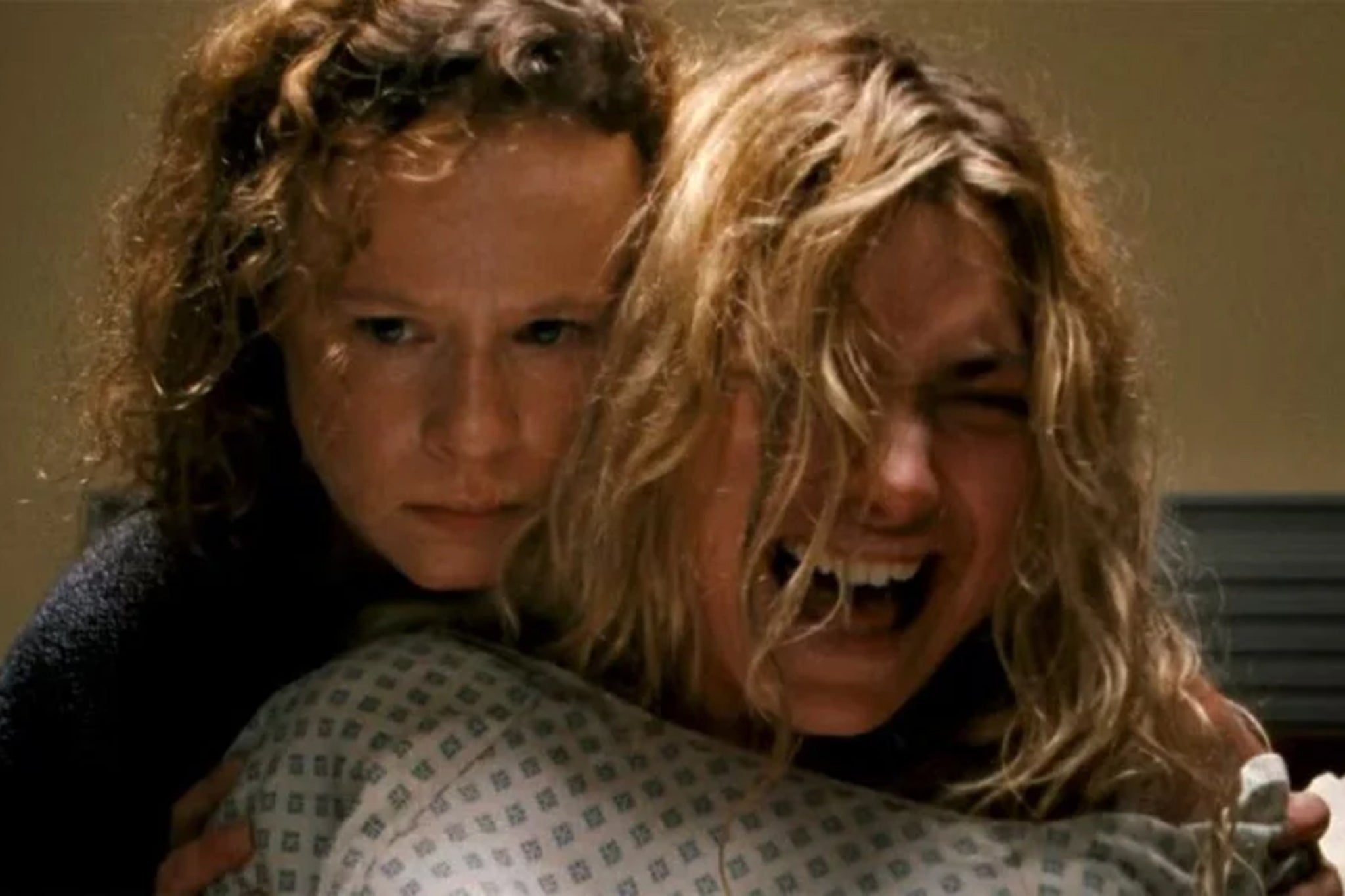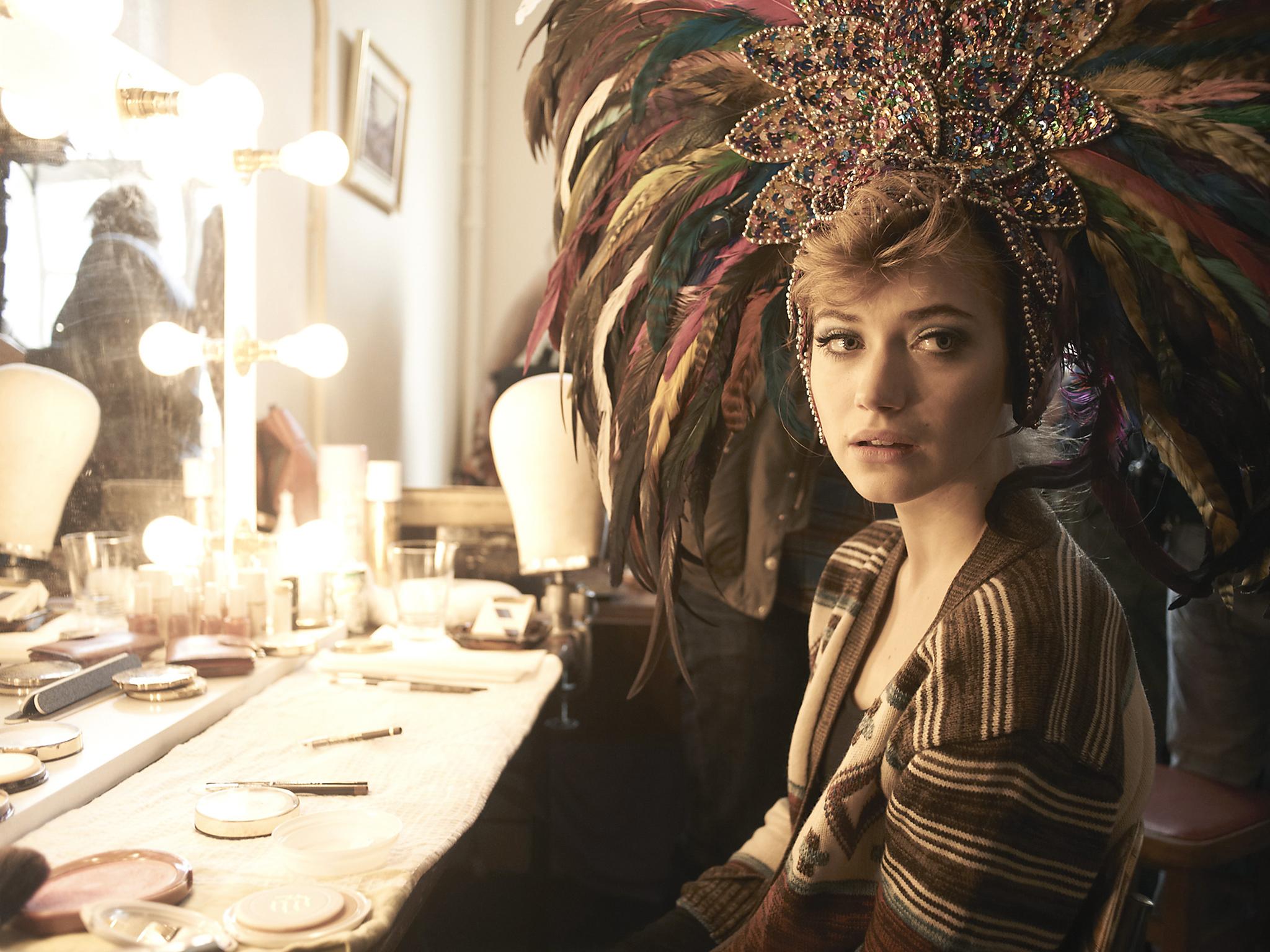
A few years back, a director told Imogen Poots she had an “attitude problem”. “I thought [his] idea was silly,” she tells me. “But he said that to me in front of a whole crowd of people, which was lame. He was a nice man, but we weren’t creatively right for one another at all, and it’s funny in hindsight how me not feeling comfortable, or not understanding something, warranted that comment. He was treating me like a kid. But at this point I see it as a compliment. Yay for attitude problems.”
We’re in a bar in Soho the day after the London Film Festival premiere of Hedda, a rambunctious rejig of Ibsen’s Hedda Gabler that demands no niceties of its combative leading lady. The blonde hair, half up, half down, tumbles disorderly. “My tolerance for bulls*** has always been pretty primed,” the 36-year-old star of 28 Weeks Later (2007) and the Oscar-winning dementia drama The Father (2020) continues. “People have often assumed I’m not aware of the trickery, but I’ve got big eyes. I see all the stuff.” Those Disney-proportioned, bulls***-detecting blue eyes blink and widen like a cat spotting its own reflection.
Poots is wearing high-waisted jeans, Nike Classics and a white T-shirt Emily Mortimer bought her at the Film Forum in New York; her nail polish is a chipped black. Inscribed across two fingers are the initials AY, in honour of a friend, the late actor Anton Yelchin. Her hands often clench and unclench, a metronome of ebullient energy. She’s sharp and solicitous, our conversation ricocheting so much that I lose track of my prepared questions. She is also very funny in that particularly English way – bone-dry one moment, nerdishly self-mocking the next. Growing up in west London, she loved cinema, obsessing over indie filmmaking titans from Terrence Malick to Peter Bogdanovich. But today there is no air of actorly pretension. “This is an industry of absolute Looney Tunes parading as if they’re normal,” she says at one point. “And then these people make movies about the real world and the human experience. Anyway...”
This is typical of Poots, thoughts and digressions spilling out. She’s supposed to be here to talk about her two new films, The Chronology of Water and Hedda. In the latter, the action has been transplanted from late-19th-century Oslo to 1950s Great Britain, where the free spirit of the title (Tessa Thompson) has moved to a country estate with her new husband, a boring academic (Tom Bateman). It’s written and directed by Nia DaCosta, who shot the 2021 Candyman horror reboot with such élan. So too Hedda. Unfolding over 12 hours at a party thrown by the newlyweds, DaCosta’s interpretation paints an exuberant picture of desire, deceit, and a sort of prurient Fifties bacchanalia. “It’s really Nia to have this luscious imagery undercut with this kind of deeply salted, wounded behaviour,” says Poots. “She spoke a lot to the costume designer about how the dresses should emulate rotting fruit, like plums and apricots.”
Inevitably, all that opulence, scheming and drunken sexual intrigue has seen Hedda compared to Saltburn, Emerald Fennell’s anarchic class satire. Poots isn’t convinced. “It just speaks of a lack of imagination,” she scoffs. “They’re probably drawing on what they believe to be salacious, but there are some more risqué films out there. It’s tenuous.”
I mention a line of dialogue in Hedda that refers to Poots’s character as a muse. As a word, viewed through a modern lens, it’s considered problematic. “I just think these days there are a lot of terms and ideas that people want to sully, turning something that was once very beautiful and inspiring into something that falls under the term ‘victim’,” says Poots, waving her hands as if conducting invisible symphonies. “I mean, if you think about Edie Sedgwick and Andy Warhol, he wasn’t just projecting onto her. She brought something to him. It was kind of a two-way street.”

Poots also points to the late, great Diane Keaton. “You could argue she was very much a muse for Woody Allen,” she says, “but that’s because he was lucky enough and smart enough to bottle this miraculous person in front of him. I have so many muses, and whenever I feel really down, those are the things and people I return to.”
A couple of days after our interview, Poots messages me to say she has been reflecting “a lot” on the muse conundrum. “With social media, it’s interesting to consider how everyone has become their own muse,” she writes. “That’s where it starts to get troubling, because you’re not looking back at history, or around you, and you’re not figuring out who you are by what moves you; you’re just staying put and putting filters on your face, to try and mean something to someone, or to yourself. Then everything starts to feel chillingly homogenous.”
If you want to smoke cigarettes and not eat, and feel thin and sultry, that’s OK. It’s a rite of passage
Poots has been in the public eye ever since she played a small part, aged 15, as the younger self of a political prisoner in 2005’s V for Vendetta. She landed her first significant role in 28 Weeks Later (2007), the post-apocalyptic horror sequel. Deciding against drama school, Poots learnt on the job. It’s paid off. For two decades, Poots has homed in on the hairline fractures in composed characters, adding a complexity that might otherwise be left concealed. In her West End debut in 2017, she held her own opposite Imelda Staunton, lending a real depth to Honey, the sozzled, condescended-to young woman in Who’s Afraid of Virginia Woolf?
There have been parts in the films of her early heroes, Bogdanovich’s screwball comedy She’s Funny That Way (2014) and Malick’s Knight of Cups (2015). Her sense of free-flowing naturalism was there too in Lorcan Finnegan’s psychological thriller Vivarium (2019), and she made a winningly fragile Jean Ross, the model for Christopher Isherwood’s Sally Bowles, in BBC’s 2011 drama Christopher and His Kind. But it was as the cocaine-addicted daughter of pornographer Paul Raymond in Michael Winterbottom’s The Look of Love (2013) that Poots really left her mark, her performance one of flayed vulnerability.

Now, in Kristen Stewart’s bold directorial debut The Chronology of Water, Poots has never been more fearless or bracingly real. She portrays Lidia Yuknavitch, the San Francisco native upon whose 2011 memoir the film is based, as she tries to escape her abusive childhood by developing an obsession with swimming. It is not easy to watch – a maelstrom of grief, resilience and self-destructive desire. The film’s lyrical, non-linear narrative shows how Yuknavitch tried to numb the lasting psychological impacts – through competition, sexual experimentation, drug addiction. Poots was “blown away” by the film’s writer-director. “I’m very proud of her,” she says. “The stakes were so high to go and make a film when you’re already a certified, very well-known movie star, so it’s a really brave thing to decide to do.”
During the filming, their shared perfectionism meant shoots ran long. Both were equally meticulous about getting scenes exactly right, says Poots, who trained so hard for the role that she gave herself a hernia. “What should take three hours would take eight.”
She pauses, smiles. “People like [Kristen] don’t really exist any more. A real individual, a very authentic and courageous and kind person.” She contrasts this with the hollow networking at industry events, where conversations feel performative and distracted. “And then you’re with someone like Kristen, and she is just incredibly present. Her eyes are boring through, seeing your bones.”
Poots notes with approval that she’s seeing “a lot more directors who are women. Maybe one day, once we’ve got enough, we can just call them ‘directors’... we don’t talk about ‘male directors’.”

Structural shifts like these are having an effect, yet Poots, who has spoken in the past about the pressure she’s felt to look a certain way, says that other changes are more internalised. “I did feel that pressure when I was younger, but not so much any more. There will always be idealising; it’s just what you do in reaction to it. Because tomorrow someone gets spooked, and suddenly there’s a new ideal. It’s dumb to try and chase that.
“At the same time,” she continues, “if you want to smoke cigarettes and not eat, and feel thin and sultry while you’re figuring it out, that’s OK. It’s a rite of passage, and everyone should get to have that. But it’s valuable, too, when that passage ultimately ends and you see how tedious that preoccupation is, and how boring it makes you.”
Poots says she’s never felt more sure of who she is. “That speaks to ageing,” she explains. “There are quite a few years where you’re oblivious to it at the time, but you’re trying things on, and you’re figuring it out, and you’re in the wrong relationships, and you’re in the wrong friendships, and there is a doubt there, but you don’t act on it.” These days, she’s learnt to trust her gut almost immediately. “I’m very happy at the moment.”

By her own admission, when she was younger, Poots sometimes felt unenthused by certain projects. In previous interviews, she couldn’t even bring herself to call the 2014 video-game adaptation Need for Speed by its name, instead referring to it as “the racecar film”. “I don’t have a bad attitude about that movie any more,” she says. “I didn’t want to be there. I was still under the impression that there was a high art, low art divide. Now I don’t think there is.”
Like that old Hollywood maxim “one for them, one for me”?
“Yeah, that’s bulls***,” she says. “There are all these rules that are supposed to be like, frame your future. I don’t think that’s real, but I think work is work. You have to start somewhere. I really don’t like people judging young actors for taking certain roles. I think people forget that young actors have to earn money.”
Having moved to the US when she was 19, Poots, who lives in Brooklyn, has recently felt the pull of the UK again. She blames Oasis. “It’s been such a thrill to have them back,” she says. “I’m really happy about their resurgence, because I think the best music in the world... Well, it’s a grand statement, but I do think the English have delivered incredible bands. I’ve seen some people walking around Brooklyn in What’s the Story (Morning Glory)? T-shirts and I’m like, ‘But did you know the album? Did you know it?’
“I’m a huge fan, but the nostalgia of it is interesting,” she adds. “It can be a real sickness.” She cites the fact that she and Brett Goldstein, her co-star in the recent romantic drama All of You, talked about getting “pre-nostalgia, which is when we’re so excited about something that we miss it even before it’s happened”.
Fitting, then, that the great British emblems of bad attitude have become Poots’s North Star, tractor-beaming her back to England. She pulls out her phone to read a quote from an Edward Albee play: “Sometimes it’s necessary to go a long distance out of the way in order to come back a short distance correctly.” Her eyes bounce up from the screen. “Isn’t that great?”
‘Hedda’ is streaming on Prime Video now; ‘The Chronology of Water’ is out in cinemas on 6 February 2026
Liam Gallagher furiously condemns fan who launched flare into Oasis crowd
Oasis reveal guitarist Bonehead’s replacement during Seoul gig
Lily James: ‘Every time I watch Alien, I go, “my God, that’s my grandma!”’
A House of Dynamite has already aged like milk – for one key reason
Charlie Kaufman: ‘They told me Being John Malkovich would never get made’
For our greatest international filmmakers, going to America can come at a cost







